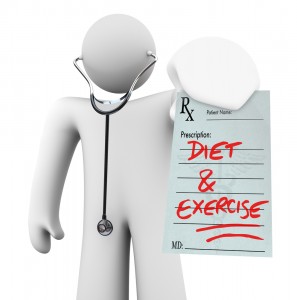
We Elves know that exercise is critical in the prevention of disease and evidence for the benefit of exercise in many forms of disease. This is highly relevant as our 5×50 worldwide exercise flash-mob challenge about to start on Friday 23rd November (see earlier post). Don’t forget to sign up for and join the Musculoskeletal Elves Team (on the 5×50 registration website #TheMSK_Elf).
Exercise is effective, inexpensive, with a low side-effect profile, and can have a positive environmental impact. However there is an apparent reluctance within the medical profession
to use exercise as a treatment option. This may be a consequence of lack of knowledge among doctors of the benefits of exercise, and a lack of practical skills in the prescription of exercise in disease states and a misunderstanding and overestimation of the risks of exercise.
So how can we help to raise the profile of exercise in the management of established disease. Luckily we found recommendations of the Sport and Exercise Medicine Committee Working Party of the Royal College of Physicians in the UK.
Here’s what they recommended
- A national strategy for physical activity, health and wellness
There should be a medically driven national strategy to use exercise in the prevention and treatment of disease. - The medical specialty of Sport and Exercise Medicine (SEM)
This new specialty needs to be integrated into the care pathways available to NHS patients. There should be action to establish NHS consultant posts in SEM and develop their roles within the exercise medicine care pathway, eg regional exercise medicine services. - QOF incentives
These are required for physical activity interventions. - Undergraduate curriculum
Medical students should receive education in SEM and training in the areas of preventive medicine and exercise prescription. - Physical activity provider regulation
The providers of exercise instruction to those injured or ill should work to appropriate professional standards, and statutory regulation of exercise therapists who treat patients should be considered. - Information management systems
These should be developed to aid primary care in the risk stratification of patients and the identification of care pathways. Systems of this nature would enable primary care practitioners to initiate exercise programmes through their practice electronic patient records. This should be the first step towards a ‘British National Formulary for exercise’. - London 2012 Olympics legacy
There is a clear opportunity to ensure a health legacy from the London 2012 Olympics through the development of pilot projects.
The Musculoskeletal Elf’s view

Allied Health Professionals (AHPs) are a group of health care professionals, the majority of whom have rehabilitation, movement and enabling people to do more as the core of their daily work. The AHP Directors Group In Scotland are working with Scottish Government to support a radical programme of action in every health board in Scotland.
Their pledge is “We will work with a range of partners to increase the level of physical activity in Scotland”. You can see the full pledge here AHP Physical Activity Pledge.
Questions
- What re you doing to promote physical activity and exercise?
- Can you share any innovative work?
Send us your views on this blog and become part of the ever expanding Musculoskeletal Elf community.
Links
- Exercise for life: Physical activity in health and disease. Recommendations of the Sport and Exercise Medicine Committee Working Party of the Royal College of Physicians
- Scottish Allied Health Professions Directors Group. AHP Physical Activity Pledge.


i must say first that i probably am a fitness junkie by hobby rather than doing it because i have too. Although i was diagnosed with ankylosing spondyilitis, last year and after a very severe flare up which left be virtually bed ridden for five months, i’m back doing triathlons, duathlons and martial arts as well as my 15 mins pilates every day, i totally believe 100% that exercise has played a key part in keeping my disease at bay for best part of a year now. Throw in a bit of mental attitude and good physios and a clinical trial and youve got a great combination, i know i will flare up again but i will come back with the same attitude, i’ve already signed up for a half marathon in march and will be competing in my first half ironman next august (1.2 mile swim 56 mile bike 13 mile run).i might be taking this exercise”lark” to the extreme but sitting in front of the tele eating chips just aint me
stuart blake